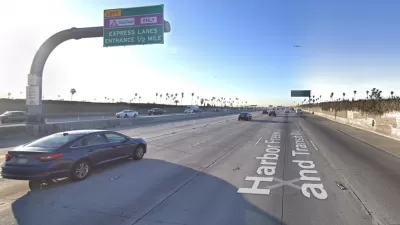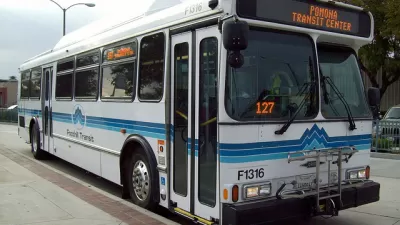While it will certainly comes as a relief to some commuters living in the San Gabriel Valley, the Metro Gold Line extension that opened earlier this month was more the result of politics than planning.
The opening of a Los Angeles Times editorial by Ethan Elkind begins innocuously enough: "The opening this month of the Gold Line extension from Pasadena to Azusa is an example of how voter-approved tax dollars are now delivering real transit projects for Los Angeles." Then comes the kicker: "It is also an example of how politics often dictate how and where Metro builds."
In the case of the widely celebrated Gold Line extension, Elkind says that planners, not politicians, could have come up with a better route for the train:
Better mass transit is necessary across the region. But not every part of the county has the population to support rail. In the case of the Gold Line, we've brought expensive train technology to a generally low-density area that could be more economically served by bus rapid transit or commuter buses running in the right-of-way.
After detailing the political bedfellows that brought the Gold Line extension into existence, Elkind looks forward, and recommends that Metro "be more willing to reject inefficient rail proposals in favor of more cost-effective options." Elkind also offers some specific ideas about what those projects might be.
FULL STORY: How politics built L.A.'s Gold Line at the expense of a smarter system

Planetizen Federal Action Tracker
A weekly monitor of how Trump’s orders and actions are impacting planners and planning in America.

Maui's Vacation Rental Debate Turns Ugly
Verbal attacks, misinformation campaigns and fistfights plague a high-stakes debate to convert thousands of vacation rentals into long-term housing.

San Francisco Suspends Traffic Calming Amidst Record Deaths
Citing “a challenging fiscal landscape,” the city will cease the program on the heels of 42 traffic deaths, including 24 pedestrians.

Amtrak Rolls Out New Orleans to Alabama “Mardi Gras” Train
The new service will operate morning and evening departures between Mobile and New Orleans.

The Subversive Car-Free Guide to Trump's Great American Road Trip
Car-free ways to access Chicagoland’s best tourist attractions.

San Antonio and Austin are Fusing Into one Massive Megaregion
The region spanning the two central Texas cities is growing fast, posing challenges for local infrastructure and water supplies.
Urban Design for Planners 1: Software Tools
This six-course series explores essential urban design concepts using open source software and equips planners with the tools they need to participate fully in the urban design process.
Planning for Universal Design
Learn the tools for implementing Universal Design in planning regulations.
Heyer Gruel & Associates PA
JM Goldson LLC
Custer County Colorado
City of Camden Redevelopment Agency
City of Astoria
Transportation Research & Education Center (TREC) at Portland State University
Jefferson Parish Government
Camden Redevelopment Agency
City of Claremont





























